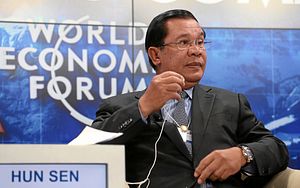For decades, rumors have circulated surrounding the net worth of Cambodian Prime Minister Hun Sen and family. Their business ties are as extensive as their land holdings, leading to speculation the banks accounts of the Huns are flushed and overflowing.
An investigation by Global Witness seems to have proven just that. Its report, Hostile Takeover, officially released today, found that the family hold either shares or directly own about 114 private domestic companies with a listed value of $200 million.
Its findings are based off of data from the Cambodian company registry. Online access, according to Global Witness, has since been restricted.
Hostile Takeover does not include the value of the family’s land assets, which observers said would substantially add to the family’s worth.
Of the $200 million, it said “this is undoubtedly just a fraction of the true value of the family’s business holdings”. Global Witness co-founder Patrick Alley told this journalist that figures of between “$500 million and $4 billion” had been touted but were unverified.
The report also says his family were “said to obscure their commercial interests behind fake names and within shell companies” while over the years “family members have been implicated in a $1 billion heroin smuggling operation, shoot-outs and a fatal hit-and-run”.
Wealth is a sensitive issue for Hun Sen, who has said he makes a wage of just $1,150 a month after 30 years in the job. Cambodia’s leader has seen his popularity dwindle in recent years as the country’s ruling few amass unimaginable wealth in a country blighted by poverty.
Under Cambodian law, officials must declare their assets every two years or face a maximum fine of $500 and up to a year in prison. Most of the family is mentioned including the First Lady, Bun Rany, who impressed with her political acumen when running the Cambodian Red Cross.
Hun Sen’s daughter Mana and senator Ly Yong Phat are singled out for their business holdings and ties to the ruling Cambodian People’s Party (CPP). They are the only two people who have interests in all three major mediums; radio, television and newspapers.
Hostile Takeover says the premier’s family has been key to the longevity of his political career through their control of key posts in politics, the military, police, media, and charities which it said were sectors that prop up the CPP through propaganda, political donations, or brute force.
“The domestic companies they are affiliated to have been accused of a litany of abuses, including the theft of land and natural resources, violence and intimidation against local populations and environmental devastation,” the report said.
“Among the most egregious examples is an agriculture company accused of using arson attacks and cobras to evict people from their homes. This has been filed as one of a huge dossier of cases at the International Criminal Court, as evidence that Cambodia’s ruling elite has committed land grabbing at such scale that it amounts to crimes against humanity.”
These companies were linked to big international brands such as Apple, Nokia, Visa, Unilever, Procter & Gamble, Nestlé, Durex and Honda, and many others.
It said the report should serve as a warning to foreign investors, particularly in China, the largest foreign direct investor in Cambodia with 18 percent in 2015, followed by Britain at a distant three percent.
The United States is Cambodia’s biggest trading partner, receiving a third of Cambodian exports, worth almost $3 billion a year.
The report said no member of the Hun family had ever been prosecuted, even while Hun Sen continues to proactively court investors from overseas and promotes Cambodia as an attractive investment destination with very little regulatory red tape and a cheap labor force.
“These revelations point to a cruel irony of Hun Sen’s model of dictatorship,” Alley said. “His family has Cambodia’s economy so sewn up that Phnom Penh residents are likely to struggle to avoid lining the pockets of their oppressors multiple times a day.”
“Foreign investors, on the other hand, can and should opt out of bankrolling a regime that kills, intimidates or locks up its critics,” he added.
While Hun Sen’s wealth is vast, on a regional level his family effort pales when compared with other regional political families. Malaysia’s Taib Mahmud is by far the richest, with he and his clan amassing a fortune from just one of the country’s states.
Taib ruled the East Malaysian state of Sarawak for 33 years and retired with a family fortune valued at more than $20 billion and held through a network of 400 companies.
A report by the Bruno Manser Fund says Taib is worth $15 billion, while the combined value of the top 20 members of his family was put at $21 billion. That makes the Taibs the world’s fifth richest family, after the Walton family of Walmart fame. The Huns still have some way to go
Luke Hunt can be followed on Twitter @lukeanthonyhunt
































